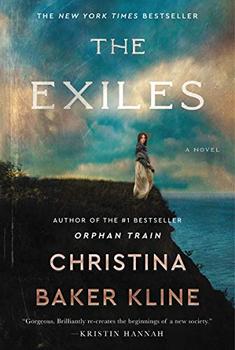Summary | Excerpt | Reading Guide | Discuss | Reviews | Beyond the Book | Readalikes | Genres & Themes | Author Bio

It had only been a few months since Mathinna's mother had died. Wanganip had always hated Flinders. She'd often climb the spiny hill near the settlement and gaze across the turquoise sea toward her homeland, sixty miles away. This terrible place, she told Mathinna—this barren island where the wind was so strong it spun vegetables out of the ground and fanned small fires into raging infernos, where the trees shed bark like snakes shed their skin—was nothing like her ancestral land. It was a curse on her soul. On all of their souls. Their people were sickly; most of the babies born on Flinders died before their first birthdays. The Palawa had been promised a land of peace and plenty; if they did as they were told, the British said, they'd be allowed to keep their way of life. "But all of that was a lie. Like so many lies we were foolish to believe," Wanganip said bitterly. "What choice did we have? The British had already taken everything."
Looking into her mother's face, Mathinna saw the fury in her eyes. Mathinna didn't hate the island, though. It was the only home she'd ever known.
"Come here, child," the governor's wife said when the dance was over, beckoning with a finger. When Mathinna obeyed, Lady Franklin peered at her closely before turning to her husband. "Such expressive eyes! And a sweet face, don't you think? Unusually attractive for a native."
Sir John shrugged. "Hard to tell them apart, quite frankly."
"I wonder if it might be possible to educate her."
"She lives with the schoolteacher, who is teaching her English," Robinson said, stepping forward. "She's quite conversant already."
"Interesting. Where are her parents?"
"The girl is an orphan."
"I see." Lady Franklin turned back to Mathinna. "Say something."
Mathinna half curtsied. The arrogant rudeness of the British no longer surprised her. "What shall I say, ma'am?"
Lady Franklin's eyes widened. "Goodness! I am impressed, Mr. Robinson. You are turning savages into respectable citizens."
"In London, I hear, they're dressing orangutans like lords and ladies and teaching them to read," Sir John mused.
Mathinna didn't know what an orangutan was, but she'd heard talk of savages around the elders' campfire—British whalers and sealers who lived like animals and sneered at rules of common decency. Lady Franklin must be confused.
Robinson gave a short laugh. "This is a bit different. The Aborigines are human, after all. Our theory is that by changing externals you can change personalities. We are teaching them to eat our food and learn our language. We feed their souls with Christianity. They've surrendered to clothes, as you can see. We've cut the hair of the men and impressed modesty on the women. We've given them Christian names to aid the process."
"The mortality rate is quite high, I understand," said Sir John. "Delicate constitutions."
"An unfortunate inevitability," Robinson said. "We brought them out of the bush where they knew not God, nor even who made the trees." He gave a small sigh. "The fact is, we all must die, and we ought to pray to God first to save our souls."
"Quite right. You're doing them a great service."
"What is this one's name?" Lady Franklin asked, returning her attention to Mathinna.
"Mary."
"And what was it originally?"
"Originally? Mathinna was her Aboriginal name. She was christened Leda by missionaries. We decided on something less ... fanciful," Robinson said.
Mathinna didn't remember being called Leda, but her mother had hated the name Mary, so the Palawa refused to use it. Only the British called her Mary.
"Well, I think she's charming," Lady Franklin said. "I'd like to keep her."
Keep her? Mathinna tried to catch Robinson's eye, but he didn't return her gaze.
Sir John looked amused. "You want to take her home with us? After what happened with the last one?"
Excerpted from The Exiles by Christina Baker Kline. Copyright © 2020 by Christina Baker Kline. Excerpted by permission of Custom House. All rights reserved. No part of this excerpt may be reproduced or reprinted without permission in writing from the publisher.
Your guide toexceptional books
BookBrowse seeks out and recommends the best in contemporary fiction and nonfiction—books that not only engage and entertain but also deepen our understanding of ourselves and the world around us.